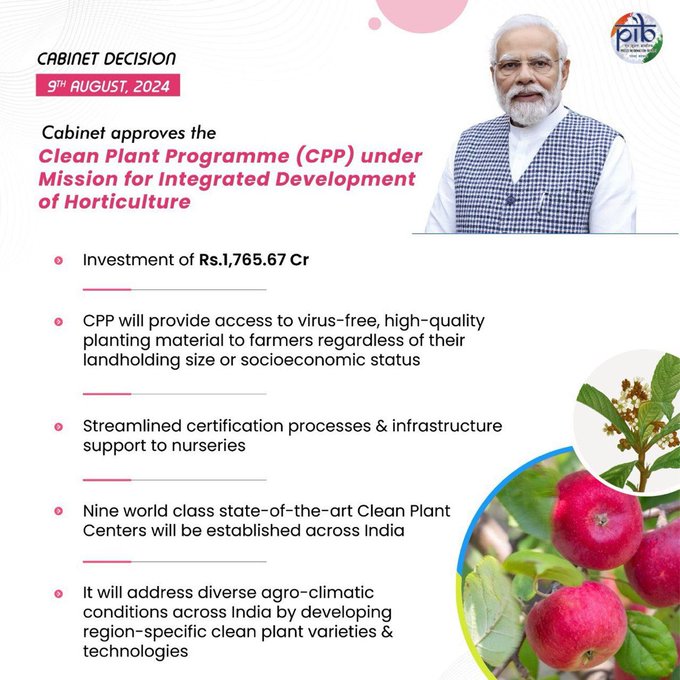Source- This post on Clean Plant Programme (CPP) has been created based on the article “Cabinet approves the Clean Plant Programme under Mission for Integrated Development of Horticulture” published in “PIB” on 10 August 2024.
Why in News?
The Union Cabinet recently approved the Clean Plant Programme (CPP) proposed by the Ministry of Agriculture and Farmers Welfare.
About Clean Plant Programme (CPP)

| Aspects | Details |
| About | The Clean Plant Programme (CPP) aims to enhance the quality and productivity of fruit crops across the nation. It is a Initiative by the Ministry of Agriculture and Farmers Welfare. |
| Implemented by | The programme will be implemented by the National Horticulture Board in collaboration with the Indian Council of Agricultural Research (ICAR). |
| Core Components of the CPP | 1. Clean Plant Centers (CPCs): Nine world-class CPCs will be set up across India. i) These centers will have advanced labs for diagnostics, therapy, and tissue culture. ii) The CPCs will be located in regions suited for specific fruit crops, such as Grapes (Pune), Temperate Fruits like Apple, Almond, and Walnut (Srinagar & Mukteshwar), Citrus Fruits (Nagpur & Bikaner), Mango, Guava, Avocado (Bangalore), Mango, Guava, Litchi (Lucknow), Pomegranate (Sholapur) and Tropical/Sub-Tropical Fruits in Eastern India 2. Certification and Legal Framework: A strong certification system will be put in place to ensure that planting materials are produced and sold with full accountability. This system will be supported by regulations under the Seeds Act of 1966. 3. Enhanced Infrastructure: Large nurseries will receive support to develop the necessary infrastructure for multiplying clean planting materials efficiently. |
| Importance of the CPP | 1. Sustainability: The programme aligns with initiatives like Mission LiFE and One Health, promoting eco-friendly farming practices. 2. Self-Reliance: It reduces the need for importing planting materials, making India more self-sufficient. 3. Global Leadership: CPP will help position India as a leading exporter of high-quality fruits, driving transformative changes in the horticulture sector. |
UPSC Syllabus: Schemes and programmes






